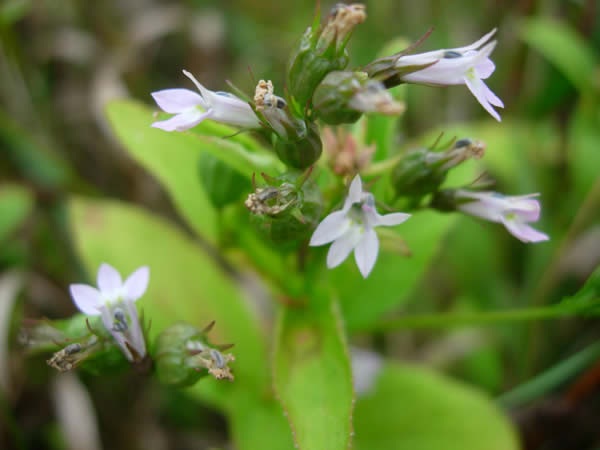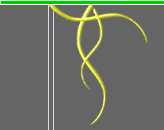| |
Lobelia (Lobelia inflata)

|
Lobelia has many common names, names which give clues to its properties and uses: asthma weed, Indian tobacco, wild tobacco, bladder pod, vomit wort, pukeweed and gagroot. Thomson discovered lobelia when he chewed on it and it made him throw up. Thereafter, he used to give it to friends as a gag. He never thought of it as a medicine until he gave it to a co-worker one day, who after throwing up, said that he felt much better.
Lobelia contains an alkaloid called lobeline, which relaxes muscles. Due to the presence of lobeline, lobelia is an emetic in large doses. An emetic induces vomiting, a property reflected by several of lobelia's common names and Thomson's personal experience. Fortunately, you don't have to use lobelia in doses large enough to make you throw up to get benefical effects from it.
Lobelia has a paradoxical effect. It first stimulates and then depress the autonomic nervous system. Small doses can ease nausea and vomiting, while large doses cause it. It has been called "the intelligent herb" because it seems to whatever is necessary to promote healing in the body. That's why Thomson used it on nearly everyone.
Lobeline, the principle alkaloid in lobelia, has a chemical structure similar to nicotine, except that it has the opposite effect. Both nicotine and lobeline attach to adrenergic and cholinergic receptors in the nervous system. Adrenergic receptor sites are for epinephrine and norepinephrine, the sympathetic neurotransmitters that increase heart rate and blood pressure to energize the body when you are startled or scared. Cholinergic receptors are for acetylcholine, the neurotransmitter responsible for stimulating muscles to contract. It is also involved in memory.
Nictoine acts on these receptors to contract blood vessels, increase blood pressure and heart rate and make muscles tense. Lobelia has the opposite effect. It dilates blood vessels, decreases blood pressure and heart rate and makes muscles relax.
These actions make lobelia one of the best antispasmodic and relaxing herbs in the plant kingdom. For starters, lobelia eases muscle tension and increases blood and lymph flow. This can be very helpful for easing any kind of cramping pain, including muscle cramps, menstrual cramps, intestinal gripe (cramping pains in the digestive tract) and constricted breathing. Midwives have even administered lobelia as a muscle relaxant to counteract pelvic rigidity during childbirth.
Lobelia also relieves the cramping of a spastic bowel. I've successfully used a mixture of peppermint glycerite and lobelia extract for severe colic and intestinal cramps, where catnip and fennel wasn't strong enough. For small children the tincture can be rubbed on the stomach and followed with a few drops of peppermint oil.
Respiratory and Lymphatic Remedy
Lobelia dilates the bronchials and relaxes muscle spasms in the lungs. This makes it one of our most valuable remedies for asthma, bronchitis, whooping cough and spastic cough. I've used lobelia tincture or extract to relieve an asthma attack by giving a small amount (10-30 drops) every couple of minutes until relief is obtained. Sometimes this will cause the asthmatic to vomit, but this will typically result in an immediate end of the attack. Again, for small children, lobelia can be rubbed into the back and chest.
I've also used small amounts of lobelia along with ALJ and garlic (oil or high potency tablets) to ease congestion in the lungs and help expell mucus and fluid in the lungs. Lobelia really helps to ease the tension when coughing and make it easier for the lungs to cough up the mucus.
Another benefit of lobelia is that it promotes lymphatic drainage. It combines well with mullein, cleavers and red clover for this purpose. By promoting better lymph drainage, lobelia can reduce swelling in lymph nodes, ease congestion, clear abscesses and help ease mumps and tonsillitis. For tonsillitis it works well with red root and echinacea.
Another use I've made for lobelia is to ease high blood pressure. Small doses (10-30 drops) repeated every 15 minutes along with deep breathing can rapid reduce high blood pressure. Lobelia combines well with the tinctures of capsicum and black cohosh for this purpose.
Smoking and Anxiety
Because lobeline has a similar chemical structure to nictotine, lobelia has been used to help people quit smoking. Lobeline was once approved as an over-the-counter anti-smoking medicine by the FDA, but I find the whole herb works better. Lobelia can be taken (preferably in liquid form) three to four times per day, plus anytime smokers have the urge to smoke. It eases craving for nicotine, counteracts some of the harmful effects of smoking and aids the lungs of smokers. Lobelia can actually make smokers feel nauseous when they smoke.
Lobelia combines well with Nutri-Calm and chamomile as a program for quitting smoking. You can also use the homeopathic Tobacco Detox with lobelia.
I've also used small, frequently repeated doses of lobelia to ease anxiety and panic attacks. Again, coach the person to breath slowly and deeply and administer a small dose of lobelia extract (kava kava extract also works) every 3-5 minutes until the attack subsides.
Topical and Other Uses
Lobelia can be used for a variety of conditions involving pain, especially when applied topically. I've warmed the extract and used it in the ears to ease earaches. I've mixed equal parts of lobelia extract with capsicum extract and massaged it into sore, tense muscles, then followed it with Tei Fu oil. Massaged into the back, these three remedies have been used as an herbal back adjustment to ease back pain and help vertebrae realign easily. This combination also works well on sprains, arthritic joints, sore throats and general aches and pains.
Lobelia has also been used topically for insect bites and stings. It reduces swelling and eases pain.
Thomson used lobelia for heavy metal poisoning from mercury and lead. It seems to help counteract poisons in general and can be used to induce vomiting in food poisoning or other internal poisoning where throwing up would be beneficial. In this instance, lobelia can be used as an alternative to ipecac.
Safety Concerns and Usage
Because of the herb’s strength and possible toxicity, lobelia is often listed as poisonous. It is said to produce convulsions, coma and death. However, no one has every died from taking lobelia and herbalists have used safely and confidently employeed this remedy with newborn infants, weak and sickly people and the elderly for over 200 years. The assertion that lobelia is toxic probably comes from research done on lobeline, but because lobelia induces vomiting it would be nearly impossible to administer enough lobelia to cause a toxic reaction.
We've already made it clear that large doses of lobelia induce nausea and then vomiting. However, the amount needed to achieve this affect varies greatly from person to person. Sometimes only a small dose is needed and sometimes larger doses will only produce nausea and perspiration, but no vomiting. If enough lobelia is taken, it can cause the muscles to relax to the point that the person can't move (something that can also happen with large doses of kava). Although this could be frightening, it wears off and the person is in no danger.
Lobelia is generally not taken on a daily basis, except for asthmatics or quitting smoking. Usually it is reserved for acute ailments where there are obstructions in the body. In capsule form, one or occasionally two capsules is a sufficient dosage for most such problems. The dosage may be repeated every one or two hours until relief is obtained. The best way to use the herb is in the form of an alchohol tincture or glycerine extract. Typical dose for an adult is 10-30 drops, which can be repeated as often as every two to three minutes until relief is obtained. If nausea or vomiting occur, peppermint tea or liquid chlorophyll (which contains peppermint oil) can be used to settle the stomach.
Disclaimer: The information presented
herein is intended for educational purposes only. These statements have not
been evaluated by the FDA and are not intended to diagnose, cure, treat or
prevent disease. Individual results may vary, and before using any supplements,
it is always advisable to consult with your own health care provider.
|
|


















